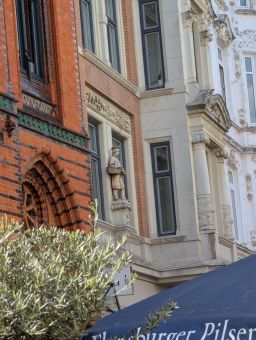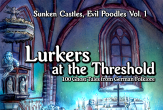The Ghosts' Meal

Bräuner’s Curiositäten, p. 336 — 340.92 Erasm. Francisci höll. Proteus, p. 42693
When Frederick III of Denmark94 called for a public gathering in Flensburg, it occurred that a noble who had traveled there for the occasion could no longer find a room in the inn, as he had arrived late in the evening. The innkeeper told him that all the rooms were occupied except for a single large one. But he himself would not recommend staying there overnight, as it was haunted and uncanny spirits were active there. The noble showed his courage with a smile and said that he was afraid of no ghosts and merely needed a lamp, so that he could better see if anything were to show up. The innkeeper brought him the lamp, which the nobleman put on the table and then reassured himself with waking eyes that no spirits could be seen.
The night was not yet half over when there was noise in the room here and there, and soon there was one rustling sound after the next. In the beginning, his courage allowed him to remain steadfast against the frightful terrors, but soon, as the noises grew louder, fear mastered him so that he began to shiver, no matter how much he tried to resist. After this prelude of uproarious and tumultuous noises, a human’s leg fell through the vent of the room’s fireplace. Then an arm, abdomen, chest, and all limbs, and finally, when nothing else was missing, the head. Soon, the parts put themselves together in the proper order, and a whole human body, resembling a servant of a court, rose up. Now more and more limbs fell down, which soon united into human forms, until finally the door of the room opened and the bright mob of an entire royal court entered.
The nobleman, who had stood frozen at the table, trembled and hurried into a corner of the room when he saw that the parade came closer, as he was unable to escape out of the door before the incoming group.
He now saw how the ghosts laid out a table with incredible nimbleness, carried in exquisite dishes, and distributed silver and golden cups. After this was done, one of them walked over to him and indicated that, as a guest and stranger, he should sit down at the table with the rest of them and enjoy their hospitality. When he refused, a large silver cup was handed to him, and he was told to drink from it. The nobleman, who was so dismayed that he had difficulties keeping his countenance, took the cup. It appeared as if they would pressure him to drink, but as he was about to raise it to his lips, he was overcome with a deep dread that shook him to the core, and which made him loudly cried out for God to give him protection and succor. As soon as he had uttered his plea, the entire splendor, the noise, and the whole feast with the splendidly-dressed, proud ghosts was gone in an instant.
However, the silver cup was still in his hand, and while all dishes were gone, the silver cutlery nevertheless remained on the table — as did the lamp that the innkeeper had given to him. The nobleman was delighted and assumed that all this was now his new property. But the innkeeper objected, and finally this matter came to the ears of the king. The king declared that the silver would fall to his purse and confiscated it. Nobody has discovered where it came from, as it was not engraved with heraldry and names as it was the usual custom.
Source: Grimm - Deutsche Sagen Band 1, p. 257ff
 Sunken Castles, Evil Poodles Volume 01: Lurkers at the Threshold. Get the book for further context and explanatory commentary! |